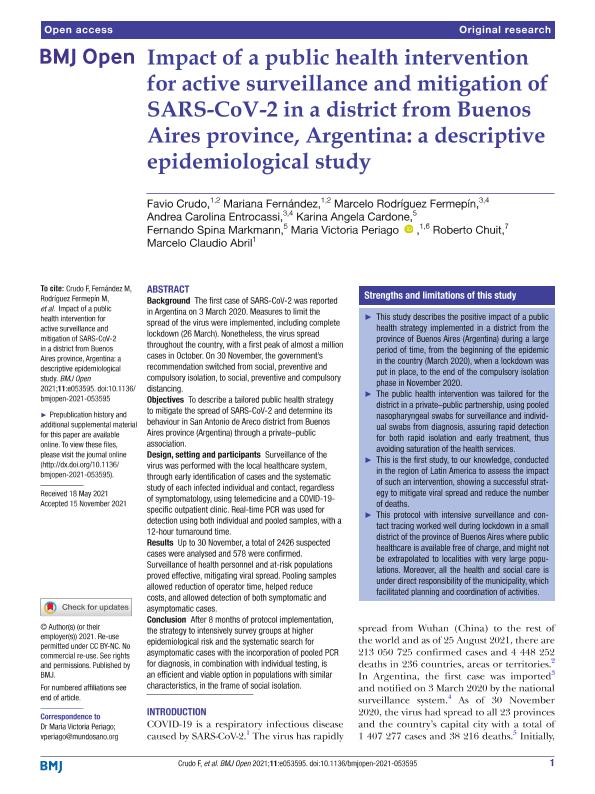Artículo
Impact of a public health intervention for active surveillance and mitigation of SARS-CoV-2 in a district from Buenos Aires province, Argentina: a descriptive epidemiological study
Crudo, Favio; Fernández, Mariana; Rodríguez Fermepín, Marcelo; Entrocassi, Andrea Carolina; Cardone, Karina Angela; Spina Markmann, Fernando; Periago, Maria Victoria ; Chuit, Roberto; Abril, Marcelo Claudio
; Chuit, Roberto; Abril, Marcelo Claudio
 ; Chuit, Roberto; Abril, Marcelo Claudio
; Chuit, Roberto; Abril, Marcelo Claudio
Fecha de publicación:
11/2021
Editorial:
BMJ Publishing
Revista:
BMJ Open
ISSN:
2044-6055
Idioma:
Inglés
Tipo de recurso:
Artículo publicado
Clasificación temática:
Resumen
Background The first case of SARS-CoV-2 was reported in Argentina on 3 March 2020. Measures to limit the spread of the virus were implemented, including complete lockdown (26 March). Nonetheless, the virus spread throughout the country, with a first peak of almost a million cases in October. On 30 November, the government's recommendation switched from social, preventive and compulsory isolation, to social, preventive and compulsory distancing. Objectives To describe a tailored public health strategy to mitigate the spread of SARS-CoV-2 and determine its behaviour in San Antonio de Areco district from Buenos Aires province (Argentina) through a private-public association. Design, setting and participants Surveillance of the virus was performed with the local healthcare system, through early identification of cases and the systematic study of each infected individual and contact, regardless of symptomatology, using telemedicine and a COVID-19-specific outpatient clinic. Real-time PCR was used for detection using both individual and pooled samples, with a 12-hour turnaround time. Results Up to 30 November, a total of 2426 suspected cases were analysed and 578 were confirmed. Surveillance of health personnel and at-risk populations proved effective, mitigating viral spread. Pooling samples allowed reduction of operator time, helped reduce costs, and allowed detection of both symptomatic and asymptomatic cases. Conclusion After 8 months of protocol implementation, the strategy to intensively survey groups at higher epidemiological risk and the systematic search for asymptomatic cases with the incorporation of pooled PCR for diagnosis, in combination with individual testing, is an efficient and viable option in populations with similar characteristics, in the frame of social isolation.
Palabras clave:
COVID-19
,
DIAGNOSTIC MICROBIOLOGY
,
EPIDEMIOLOGY
,
PUBLIC HEALTH
Archivos asociados
Licencia
Identificadores
Colecciones
Articulos(SEDE CENTRAL)
Articulos de SEDE CENTRAL
Articulos de SEDE CENTRAL
Citación
Crudo, Favio; Fernández, Mariana; Rodríguez Fermepín, Marcelo; Entrocassi, Andrea Carolina; Cardone, Karina Angela; et al.; Impact of a public health intervention for active surveillance and mitigation of SARS-CoV-2 in a district from Buenos Aires province, Argentina: a descriptive epidemiological study; BMJ Publishing; BMJ Open; 11; 11; 11-2021; 1-9
Compartir
Altmétricas



